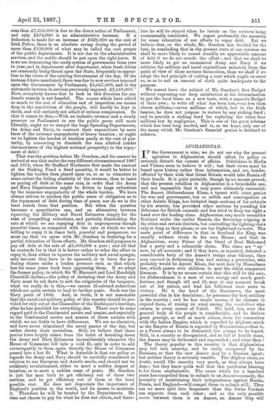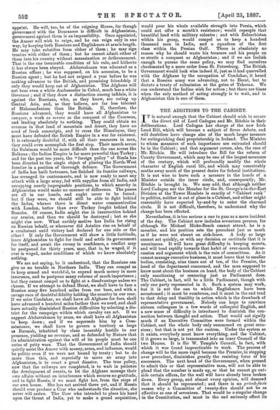AFGHANISTAN.
IF the Government is wise, we do not see why the present, agitation in Afghanistan should affect its policy or seriously disturb the current of affairs. Politicians in Berlin. and Vienna seem to believe it will ; but their views must be based upon history rather than information, and are, besides, affected by their wish that Great Britain would take Russia off their hands. It is quite probable, though by no means proved, that the present rebellion in Afghanistan is a formidable one, and not impossible that it may prove ultimately successful. The Ameer, Abdurrahman Khan, a tyrant with some genius for war and government, but as selfish and unscrupulous as other Asiatic Kings, has irritated large sections of his subjects by his avarice, has provoked other sections by parading his deference for British counsels, and has tried to keep too tight a hand over the leading clans. Afghanistan very much resembles Scotland under the earlier Stuarts, the Sovereign reigning in the cities and certain districts, but controlling the fighting clang only so long as they please, or are too frightened to resist. The main point of difference is that in Scotland the King was. usually without rivals in his own House ; and that in Afghanistan, every Prince of the blood of Deist Mahomed has a party and a colourable claim. The clans are " up " now, by all accounts ; and if they have, as reported, defeated a considerable body of the Ameer's troops near Ghazni, they may succeed in dethroning him and seating a pretender, who probably would be Ayoub Khan, the next heir by Mussulraan law, which passes over children to seat the eldest competent kinsman. It is by no means certain that this will be the ease, for Abdurrahman is a man of rare energy and much good. fortune, and though old and ill, may at any moment break out of his palace, and lead his followers once more to victory. He is the head of the Douranees, the most powerful clan in his dominions; he possesses the beet artillery in the country ; and he has ample means, if he chooses to expend them, of raising an army among the condottieri who swarm in every corner of Calm?. His hold, too, over the general body of the people is considerable, and he derives great prestige, as well as much odium, from his connection with the Indian Empire, which is regarded by Afghans much as the Empire of Russia is regarded by Roumanians,—that is, as a Power always to be distrusted, but always to be feared. Still, in a country so disorganised, and so full of hostile clans, the Ameer may be dethroned and superseded ; and what then ?
The theory popular in this country is that Afghanistan may fall into anarchy, and be easily conquered by the Russians, or that the new Ameer may be a Russian agent; but neither theory is seriously tenable. The Afghan clans, no doubt, would like anarchy very much, as they always have done ; but they know quite well that this particular blessing is for them unattainable. The cause which for a hundred years has compelled them to submit to an Ameer—namely, the necessity of maintaining their independence against Russia, Persia, and England—will compel them to submit still. They can no more split into fragments than the Swiss Cantons can separate from each other ; and as the only passible nexus between them is an Atneer, an Amer they will appoint. He will, too, be of the reigning House, for though government with the Douranees is difficult in Afghanistan, government against them is an impossibility. Once appointed, the Ameer will wish to reign, and he can reign only in one way, by keeping both Russians and Englishmen at arm's-length. He may take subsidies from either of them ; he may sign treaties with either of them ; but he cannot admit either of them into his country without assassination or dethronement. That is the one inexorable condition of his rule, and hitherto it has always been obeyed. Abdurrahman was educated as a Russian officer ; he was supposed, on his accession, to be a Russian agent ; but he had not reigned a year before he was making advances to the British, and promising friendship if only they would keep out of Afghanistan. The Afghans will not bear even a white Ambassador in Cabul, ranch leas a white Governor ; and if they draw a distinction among infidels, it is against the Russians, who, as they know, are eating up Central Asia, and, as they believe, are far less tolerant of Mahomedanism than the British. If, therefore, the Russians advanced, they would have all Afghanistan to conquer, a work as severe as the conquest of the Caucasus, and leading absolutely to nothing. They could obtain no revenue in that land of mountain and desert, they have no need of fresh conscripts, and to cross the Himalayas, they must have defeated the British Empire in a war for existence. It is extremely doubtful if, with all their resources in men, they could even accomplish the first step. Their march across the Suleiman would be more difficult than the one across the Balkans ; the Indian Empire is far more powerful than Turkey ; and for the past ten years, the "foreign policy" of Simla has been directed to the single object of placing the North-West frontier in a position of thorough defence. The Government of India has built fortresses, has finished its frontier railways, has arranged its cantonments, and is now ready to meet any attack with a large army, fed with supplies from all India, and occupying nearly impregnable positions, to which anarchy in Afghanistan would make no manner of difference. The passes are all in our hands, and ought never to be forced; but if they were, we should still be able to fight behind the Indus, whence there is direct water communication with London, better than ever Turkey fought behind the Danube. Of course, India might rise in insurrection behind our armies, and then we should be destroyed ; but so she might rise now. What earthly motive has India for rising on Russian behalf, or whenever did Asiatics rise on behalf of a combatant until victory had declared for one side or the other If only the Government will show a little fortitude, leave Afghanistan to fight for itself and settle its government for itself, and await the enemy in confidence a conflict may
be postponed for thirty years, may, that is, waged, if it ever is waged, under conditions of which we know absolutely nothing.
We are not saying, be it understood, that the Russians can give us no trouble in Northern India. They can compel us to keep armed and watchful, to expend much money in mere insurance, and to postpone many reforms of much importance ; but they cannot compel us to fight at a disadvantage unless we choose. If we attempt to defend Herat, we shall have to face a Russian army five hundred miles from our base, and with a savage race of doubtful fidelity holding the country in our rear. If we seize Candahar, we shall have all Afghans for foes, shall have advanced a hundred miles farther than we need, and shall have actually diminished Russian difficulties by selecting a dis- trict for the campaign within which cavalry can act. If we support Abdurrahman by arms, we shall have all Afghanistan to keep down ; and if we supersede him by a Com- missioner, we shall have to govern a territory as large as Burmah, inhabited by clans incurably hostile to our presence, yielding no revenue, and so defended by Nature that its administration against the will of its people must be one series of petty wars. That the Government of India should quietly assist the A meer with money, arms, and influence, would be politic even if we were not bound by treaty ; but to do more than this, and especially to move an army into Afghanistan, is to court a great disaster. The true policy, now that the railways are completed, is to wait in patience the development of events, to let the Afghans manage their own affairs without an interference which secures no gratitude, and to fight Russia, if we must fight her, from the steps of our own house. She has not arrived there yet, and if Russia should ever produce a Czar who understands the situation, she never will arrive. The Czar who intended to place his hand upon the throat of India, yet to make a grand acquisition,
would pour his whole available strength into Persia, which could not offer a month's resistance ; would repeople that beautiful land with military colonies ; and with Beloochistan within his grasp, would compel us to keep a hundred thousand men in India, and a squadron of the first class within the Persian Gulf. There is absolutely no reason why he should waste his treasure and his people on so sterile a conquest as Afghanistan ; and if we are foolish enough to pursue the same policy, we may find ourselves checkmated by a mere order from St. Petersburg. The British Government would look wise indeed if, just as it had quarrelled with the Afghans by the occupation of Candahar, it heard that a Russian army was advancing, not to Herat, but to dictate a treaty of submission at the gates of Teheran. We can understand the Indian wish for action ; but there are times when the only method of acting strongly is to wait, and in Afghanistan this is one of them.



































 Previous page
Previous page